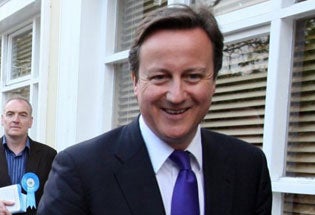Your support helps us to tell the story
From reproductive rights to climate change to Big Tech, The Independent is on the ground when the story is developing. Whether it's investigating the financials of Elon Musk's pro-Trump PAC or producing our latest documentary, 'The A Word', which shines a light on the American women fighting for reproductive rights, we know how important it is to parse out the facts from the messaging.
At such a critical moment in US history, we need reporters on the ground. Your donation allows us to keep sending journalists to speak to both sides of the story.
The Independent is trusted by Americans across the entire political spectrum. And unlike many other quality news outlets, we choose not to lock Americans out of our reporting and analysis with paywalls. We believe quality journalism should be available to everyone, paid for by those who can afford it.
Your support makes all the difference.David Cameron issued a warning to voters today not to "sleepwalk" into a change of voting system for Westminster elections with damaging consequences for Britain's democracy.
The Prime Minister warned that with millions of voters so far showing little interest in the May 5 referendum on the adoption of the alternative vote (AV) for parliamentary elections, the Yes campaign could triumph by default.
As the two main party leaders fronted rival No and Yes campaign events, Labour's Ed Miliband accused the No campaign of spreading "groundless fears" that AV would help extremist parties like the British National Party.
Senior Tories, meanwhile, signalled they could oppose legislation to introduce AV based on a strong Yes vote in Scotland, Wales, and Northern Ireland where turnout is likely to be boosted by parliamentary and assembly elections on the same day.
Mr Cameron, appearing on a cross-party No to AV platform with the Labour former home secretary Lord Reid, warned that a low turnout overall could favour the Yes campaign.
He described the unwillingness of many voters to engage with the arguments over AV as a "problem".
"The biggest danger right now is that Britain sleepwalks into this second-rate system that damages our democracy," he said.
The Prime Minister said of the AV system that "it's obscure, it's unfair, it's expensive" and that it could mean "people who come third in elections will end up winning".
"I think that is unfair and wrong and flies in the face of centuries of our history," he said.
Mr Cameron sought to distance himself from the No campaign attacks on Deputy Prime Minister Nick Clegg, whose Liberal Democrat party strongly supports voting reform.
"I don't run the No campaign, I run the Conservative No campaign," he said. "I certainly don't condone any personal attacks on anyone in this campaign."
However, Lord Reid - standing alongside the Prime Minister - accused the Lib Dems of pushing for AV out of "narrow self-interest" because they believed it would help them in future parliamentary elections.
"It would not only be wrong but it would be an outrage to try and secure a change in the electoral system for tactical party advantage by usurping the right of all of our citizens to an equal vote," he said.
"There is, I have to say, a growing and well-founded suspicion that that is exactly, at least part of the aims of the Yes campaign and I include in that the leadership of the Lib Dems."
Lord Reid also warned of the dangers if the Government tried to push through a major constitutional change after "a very, very low turnout" in the referendum.
His concerns were echoed by senior Tory backbencher Eleanor Laing who warned the result would be "called into question" if there was a Yes vote as a result of a disproportionate level of support for AV in Scotland and Wales.
Mrs Laing, a member of the Commons Political and Constitutional Reform Committee, said that turnout was likely to be much lower in London and other parts of England where there were no council elections on May 5.
"A differential turnout in different parts of the UK would call into question the legitimacy of the referendum. That would not be fair and it would be bad for democracy," she told BBC Radio 4's The World at One.
"If hardly anybody votes in London and a very large number vote in Scotland and Wales, yes, there will be a result but it will be called into question."
Mr Miliband, who was also appearing on a cross-party platform alongside Lib Dem Business Secretary Vince Cable, urged voters not to use the referendum as an opportunity to give Mr Clegg a "kicking".
"The chance to send a message to this Conservative-led Government lies in the elections that are taking place in English local government, in Scotland and Wales," he said.
"This referendum is not about Nick Clegg, it's not about David Cameron, it's not about me. It is a chance to have a better politics in Britain."
He dismissed suggestions that coalitions would become the norm with AV, or that the system would help minor parties like the BNP.
"I reject all of those groundless fears and I urge people of all persuasions to choose hope over fear."
Mr Cable brushed aside claims that Mr Clegg was a "liability" for the Yes campaign and expressed his disappointment that the Labour leader had not been prepared to share a platform with him.
"I would like to see them sharing a platform," he said.
With many Lib Dem activists questioning the value of remaining in the coalition if it cannot deliver electoral reform, Mr Cable also dismissed suggestions that Mr Clegg's leadership could be under threat if there was a No vote.
"I am very confident he will continue as leader of the party. He's a very good leader," he said.

Join our commenting forum
Join thought-provoking conversations, follow other Independent readers and see their replies
Comments